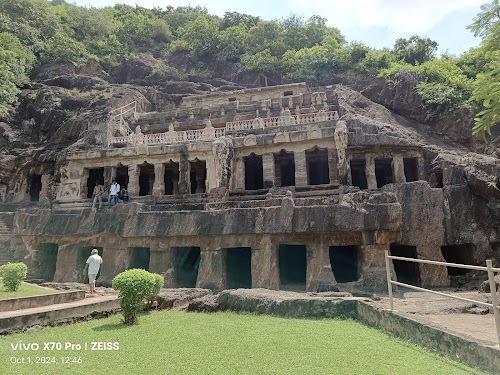
Undavalli Cave Temple
Amaravati, India
- Admire the reclining Vishnu statue.
- Enjoy panoramic views of the countryside.
- Explore the multi-level cave architecture.
- Learn about the temple's history.
- Photograph the intricate rock carvings.
Known for:
Description:
The Undavalli Caves are a magnificent testament to ancient Indian rock-cut architecture. Carved from a sandstone hillside, these caves feature multiple levels adorned with intricate sculptures dedicated to Hindu deities, primarily Vishnu. The most striking feature is the massive reclining statue of Vishnu, sculpted from a single granite block. The caves also showcase impressive examples of early Gupta-era art and architecture, attracting history buffs, art enthusiasts, and spiritual seekers alike. Exploring the different levels reveals various chambers, pillars, and detailed carvings depicting scenes from Hindu mythology. The site offers panoramic views of the surrounding countryside, making it a visually stunning and culturally enriching experience.
History:
The Undavalli Caves are believed to have been carved out of solid rock between the 4th and 5th centuries AD, during the reign of the Vishnukundina dynasty. Initially, the caves were likely associated with Jain monks, as evidenced by some of the early carvings. However, they were later converted into a Hindu temple complex. The main cave is dedicated to the Hindu trinity – Brahma, Vishnu, and Shiva. The colossal reclining statue of Vishnu is a later addition, attributed to the Gupta period. Over the centuries, the caves have witnessed various dynasties and cultural influences, leaving behind a rich tapestry of art and religious expression. They stand as a remarkable example of the fusion of different artistic styles and religious beliefs prevalent in ancient India.